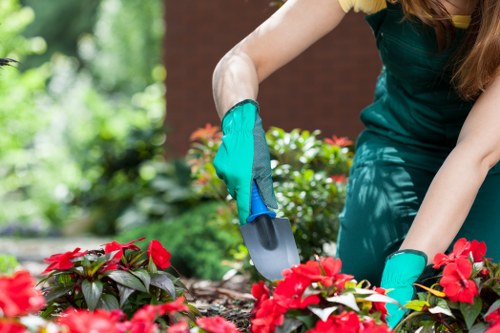Driveway Algae Removal Fulwell: A Comprehensive Guide

Maintaining the cleanliness of your driveway is essential for both aesthetic appeal and safety. One common issue many residents in Fulwell face is algae growth on their driveways. Algae not only makes your driveway look unkempt but can also create slippery surfaces, posing a hazard to pedestrians and vehicles alike.
Algae thrives in damp, shaded environments, making driveways the perfect breeding ground, especially after periods of rain. Understanding how to effectively remove algae is crucial for every homeowner looking to preserve their property's value and appearance.
In this guide, we'll explore the causes of algae growth, various removal methods, and preventive measures to keep your driveway algae-free. Whether you prefer DIY solutions or professional services, this article has got you covered.

Understanding Algae Growth on Driveways
Algae are tiny plants that thrive in moist environments. Unlike mold or moss, algae tend to have a brighter green color and can quickly spread across surfaces given the right conditions.
The primary factors contributing to algae growth on driveways include:
- Moisture: Frequent rain or poor drainage creates the damp conditions algae need to flourish.
- Shade: Areas of your driveway that receive limited sunlight are more susceptible to algae growth.
- Organic Material: Leaves, dirt, and other debris can provide nutrients for algae to grow.
Recognizing these factors can help in both removal and prevention efforts, ensuring that your driveway remains clean and safe.

Causes and Prevention of Algae on Driveways
Common Causes
Several conditions contribute to the proliferation of algae on driveways:
- Inadequate Drainage: Poor water drainage can lead to standing water, creating ideal conditions for algae.
- Shady Areas: Limited sunlight reduces the natural drying process, allowing algae to thrive.
- Organic Debris: Accumulated leaves and dirt can hold moisture and provide nutrients for algae.
Addressing these causes is the first step in preventing future algae growth.
Preventive Measures
Implementing the following strategies can help minimize algae growth:
- Improve Drainage: Ensure that your driveway slopes correctly to direct water away.
- Increase Sunlight Exposure: Trim overhanging branches to allow more sunlight to reach your driveway.
- Regular Cleaning: Remove debris promptly to reduce moisture and nutrient sources.

Methods for Driveway Algae Removal
Chemical Treatments
Chemical solutions are often effective in removing algae. These typically include diluted bleach or specialized algae removal products available at local hardware stores.
**Pros:** Quick and effective; may prevent immediate regrowth.
**Cons:** Can be harmful to surrounding plants and pets; requires careful handling to avoid damaging the driveway surface.
Pressure Washing
Pressure washing uses high-powered water jets to remove algae and other debris from your driveway.
**Pros:** Environmentally friendly; provides a deep clean without chemicals.
**Cons:** May not remove deeply embedded algae; requires access to a pressure washer or hiring a professional service.
Eco-Friendly Solutions
For those concerned about the environment, eco-friendly methods such as vinegar and baking soda mixtures can be effective.
- Vinegar: Acts as a natural disinfectant to kill algae.
- Baking Soda: Helps scrub away algae without harming the driveway.
These methods are safer for plants and pets but may require more effort compared to chemical treatments.

Choosing the Right Service for Driveway Algae Removal Fulwell
When dealing with persistent algae issues, hiring a professional service might be the best option. Professional algae removal services in Fulwell offer expertise and equipment to ensure thorough cleaning.
**Factors to Consider When Choosing a Service:**
- Experience: Look for companies with a proven track record in algae removal.
- Methods Used: Ensure they use safe and effective cleaning methods suitable for your driveway type.
- Cost: Obtain quotes from multiple providers to find a service that fits your budget.
- Customer Reviews: Check testimonials and reviews to gauge customer satisfaction.
By carefully selecting a reputable service, you can achieve a clean, algae-free driveway with minimal hassle.
Benefits of Professional Services
Professional algae removal services offer several advantages:
- Expertise: Professionals understand the best techniques for different driveway materials.
- Efficiency: They can often complete the job faster and more effectively than DIY methods.
- Equipment: Access to specialized tools and products ensures a thorough clean.
Investing in professional services can save time and provide peace of mind knowing the job is done correctly.

DIY vs Professional Algae Removal
Do-It-Yourself Methods
DIY algae removal can be a cost-effective solution, especially for minor infestations. Common DIY methods include:
- Using household cleaners like bleach or vinegar.
- Scrubbing with a stiff brush.
- Applying baking soda mixtures.
While these methods are accessible, they may require significant effort and time to achieve desired results.
Hiring Professionals
For more severe algae problems, hiring professionals may be more efficient. Professionals can:
- Provide a deeper clean.
- Use advanced equipment.
- Prevent potential damage to driveway surfaces.
Ultimately, the choice between DIY and professional services depends on the extent of algae growth and your personal preferences.
Cost Comparison
While DIY methods are generally less expensive upfront, professional services can offer long-term benefits by preventing recurrent algae growth. Consider the following:
- Initial Costs: DIY requires purchasing cleaners and tools, whereas professionals charge for their services.
- Time Investment: DIY methods can be time-consuming, while professionals can complete the job more quickly.
- Effectiveness: Professionals may provide a more thorough and lasting solution.
Assess your budget and time constraints to determine the best approach for your situation.

Maintenance Tips to Prevent Future Algae Growth
Preventing future algae growth involves regular maintenance and proactive measures. Here are some effective tips:
- Keep Driveway Clean: Regularly sweep away leaves and debris that can trap moisture.
- Ensure Proper Drainage: Check for and fix any drainage issues to prevent standing water.
- Increase Sunlight Exposure: Trim nearby vegetation to allow more sunlight to reach your driveway.
- Use Algaecides: Apply eco-friendly algaecides as a preventive measure during the growing season.
- Regular Inspections: Periodically check your driveway for early signs of algae and address them promptly.
By incorporating these practices, you can maintain a clean and safe driveway, minimizing the risk of algae recurrence.
Seasonal Maintenance
Different seasons require specific maintenance approaches:
- Spring: Clean up after winter storms, remove debris, and apply preventive treatments.
- Summer: Ensure adequate sunlight by trimming trees and bushes; address any drainage issues caused by heavy rains.
- Autumn: Regularly remove falling leaves and debris that can promote algae growth.
- Winter: Prevent ice formation by ensuring proper drainage and promptly removing snow and slush.
Adapting your maintenance routine to seasonal changes can significantly reduce algae-related problems.

Local Services in Fulwell and Nearby Areas
Fulwell is surrounded by several areas that also benefit from algae removal services. Understanding the local options can help you choose the best service provider for your needs.
Nearby Areas
- Twickenham: Located just northeast of Fulwell, Twickenham offers a range of professional algae removal services with a focus on sustainable practices.
- Shepperton: To the west, Shepperton residents can access expert driveway cleaning solutions tailored to various driveway materials.
- Hampton Wick: South of Fulwell, Hampton Wick boasts companies specializing in eco-friendly algae removal techniques.
- Whitton: Northeast of Fulwell, Whitton is home to skilled service providers offering competitive pricing for driveway maintenance.
- Stainsby: Northwest, Stainsby offers comprehensive cleaning services, including algae treatment and prevention plans.
- Ham: Directly east, Ham residents can find reliable professionals with positive customer reviews for algae removal.
- Richmond: Southwest, Richmond offers high-end services with advanced equipment for thorough algae cleaning.
- Kew: West of Fulwell, Kew provides specialized services for various driveway surfaces, ensuring effective algae removal.
- East Twickenham: Northeast, East Twickenham features local businesses focused on affordable and efficient algae treatment solutions.
- Syon: North of Fulwell, Syon offers expert services with a commitment to environmental responsibility.
By considering these nearby areas, Fulwell residents have access to a wide range of services, ensuring that algae removal is both effective and convenient.
Conclusion
Algae growth on driveways is a common issue in Fulwell, but with the right knowledge and resources, it can be effectively managed and prevented. Whether you choose to tackle the problem yourself or hire a professional service, taking proactive steps ensures a clean, safe, and aesthetically pleasing driveway.
Remember to address the underlying causes of algae growth, maintain regular cleaning routines, and consider preventive measures to minimize future occurrences. With these strategies in place, your driveway will remain free from algae, enhancing the overall appeal and safety of your property.
Frequently Asked Questions
1. How often should I clean my driveway to prevent algae growth?
It's recommended to clean your driveway at least twice a year, preferably in the spring and autumn. Regular cleaning helps remove debris and prevent moisture buildup, reducing the likelihood of algae growth.
2. Are there eco-friendly products available for algae removal?
Yes, there are several eco-friendly options such as vinegar, baking soda, and specialized green algaecides. These alternatives are safer for the environment and your household while effectively removing algae.
3. Can algae damage my driveway surface?
While algae itself doesn't cause structural damage, it can make the surface slippery and pose safety hazards. Additionally, prolonged moisture from algae can contribute to the deterioration of the driveway material over time.
4. Is professional algae removal worth the cost?
Professional services offer thorough cleaning and long-term prevention strategies, which can save you time and effort. If algae is a persistent problem, investing in professional removal may be more effective in the long run.
5. How can I prevent algae from returning after removal?
Implementing preventive measures such as improving drainage, increasing sunlight exposure, and maintaining regular cleaning schedules can significantly reduce the chances of algae returning to your driveway.


